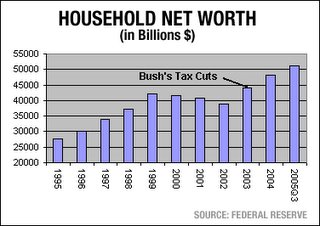Economist puts the spotlight on central planners
Economist William Easterly went straight to the people who are the problem and put the spotlight in their eyes.
Central planning was supposed to lead the world, because smart people would get all the data and make the best decisions. Communist economies in the Soviet Union and east Europe were supposed to leave us behind. After all, we had dirt farmers deciding what to plant. How could they know enough?
Part of the reason Communism failed was because 1,000 central planners were not as smart as 1,000,000 farmers. Plus the farmers are striving to save their farms, while the bureaucrats have none of their skin on the line. Central planning failed completely.
Except countries that receive large foreign aid. Tim Worstall reports at TCS Daily:
[Easterly] opens with this piece of fighting talk:Worstall covers Easterly's four main points in detail. I will shorten them:
"Seventeen years after the fall of the Berlin Wall, there is only one major area of the world in which central planning is still seen as a way to achieve prosperity -- countries that receive foreign aid. Behind the Aid Wall that divides poor countries from rich, the aid community is awash in plans, strategies, and frameworks to meet the very real needs of the world’s poor. These exercises only make sense in a central planning mentality in which the answer to the tragedies of poverty is a large bureaucratic apparatus to dictate quantities of different development goods and services by administrative fiat. The planning mindset is in turn linked to previously discredited theories, such as that poverty is due to a “poverty trap,” which can only be alleviated by a large inflow of aid from rich country to poor country governments to fill a “financing gap” for poor countries. The aid inflow is of course administered by this same planning apparatus."
The four core beliefs of development economic planners:
1) That there is a financing gap; that more investment is needed (and that there is a direct relationship between the level of investment and growth); and if we sent that extra cash as aid, then it would become that extra investment… As Easterly points out, even the people writing the papers for the World Bank on the issue ... point out that the extra cash strategy is wanting, and that investment-growth correlation is false.And Easterly reaches the same conclusion.
2) That there is a poverty trap; that prevents countries from developing seems unobjectionable. Places might simply be too poor to ever save enough to actually get going. Or, in an alternative formulation: all are so desperately searching for that scrap of food for today that they never have a chance to plan and build for the longer term. There are indeed some statistics that support this contention, but unfortunately they are not very convincing ones:
"It doesn’t help the poverty trap story that 11 out of the 28 poorest countries in 1985 had NOT been in the poorest fifth back in 1950. They had gotten into poverty by declining from above, rather than being stuck in it from below, while others escaped. If the identity of who is in the poverty trap keeps changing, it must not be much of a trap."
3) That aid should be of the government-to-government model; That is, that the wise and good of our society should be using the (forced) charity of the citizenry to aid the wise and good of another country, to in turn aid the poor of their country. Such might be fine if those wise and good were, in fact, wise and good rather than whatever group of scumbags that had managed to climb to the top of the dungheap. (The Professor is, of course, a little more diplomatic about it and probably doesn’t share my view that the same is true of our own “wise and good”). But there is little evidence of benevolent, corruption-free dictators:
The search for the elusive “well governed low income countries” casts a broad net. The Millennium Project report lists 63 poor countries that are “potentially well governed,” and thus potentially eligible for a massive increase in foreign aid. The list includes 5 out of the 7 countries singled out by Transparency International in October 2004 as the most corrupt in the world: Azerbaijan, Bangladesh, Chad, Nigeria, and Paraguay. ....
(4) That sending in aid is equivalent to actually achieving any of the desired development goals; It’s extremely difficult to find evidence of success outside of the most limited (and specific) programs -- e.g. vaccinations. But in terms of general development aid? There are very few signs of success.
What Easterly really wants is for people to understand that, in the same way top-down planning didn’t make the Soviet block rich, it isn’t going to make the poor countries rich. Development is a series of very small steps, all of which must be subjected to both responsibility criteria (accountability) and to information feedback mechanisms. Two things that simply don’t exist in any such system of top-down planning.And Worstall's favorite part: "But clear and concise views on what should be done about development don’t produce the laughter and cheering noted above. No, rather it was where he gave the speech. Easterly castigates the entire structure and organization of the development bureaucracy. The World Bank, the IMF, well-meaning yet muddled do-gooders like Bono and Sachs, just about anyone and everyone who sits in an office and talks about such things. And where does he do this? At the Asian Development Bank -- a part of that very same development infrastructure."


